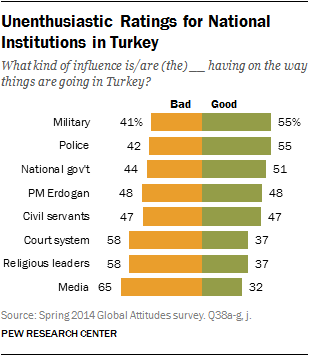This week, representatives for the Committee to Protect Journalists and the International Press Institute are meeting with government officials in Turkey to discuss what the organizations say are increasing restrictions on press freedom and growing concerns about journalists’ safety. The country banned Twitter earlier this year, which prompted a lawsuit from Turkish journalists. And last month, the U.S. State Department criticized Turkish officials for threatening a New York Times reporter.
Media advocates have also voiced concern about the government’s detention of the press. 211 journalists were jailed worldwide last year, and Turkey led the way with 40 journalists behind bars, according to a 2013 report by the Committee to Protect Journalists. Turkey was also the No. 1 country to imprison journalists in 2012, with 49 detained according to the report.
 Pew Research Center does not have polling data on press treatment, but we did recently poll the Turkish public on the media’s influence on the nation. Only 32% of Turks said that the media is having a good influence on the way things are going in Turkey. Although no institution earned a large majority of support, the media ranked lower than the military (55%), the police (55%), the national government (51%) and then Prime Minister Recep Tayyip Erdogan (48%). Turkish views of the media were also slightly lower than public opinion of the court system (37%) and religious leaders (37%).
Pew Research Center does not have polling data on press treatment, but we did recently poll the Turkish public on the media’s influence on the nation. Only 32% of Turks said that the media is having a good influence on the way things are going in Turkey. Although no institution earned a large majority of support, the media ranked lower than the military (55%), the police (55%), the national government (51%) and then Prime Minister Recep Tayyip Erdogan (48%). Turkish views of the media were also slightly lower than public opinion of the court system (37%) and religious leaders (37%).
Despite low ratings for the media (which is categorized as television, radio, newspapers and magazines) and complaints that Turkish news organizations were slow to cover the Gezi protests, most Turks are not turning away from traditional outlets. Nearly nine-in-ten said they tuned into national TV for news coverage of the anti-government protests. Newspapers also ranked high, with about three-quarters reporting getting their news there.
Only half said they obtained news from social networking sites and even fewer (31%) got protest news from online news groups, blogs or photo sites. Although the internet was not a top source for keeping up with the large demonstrations against redevelopment of Gezi Park, a 2013 Pew Research survey found that roughly six-in-ten Turks said they want uncensored internet access.
But younger generations were more likely to turn to social networking sites and online news than older groups. While 70% of 18-29 year old Turks said they used social media for protest news, only 29% of those 50 and over did so. Still the majority of adults under 30 said they used traditional sources like national TV (88%) and newspapers (79%) to access information about the demonstrations.



